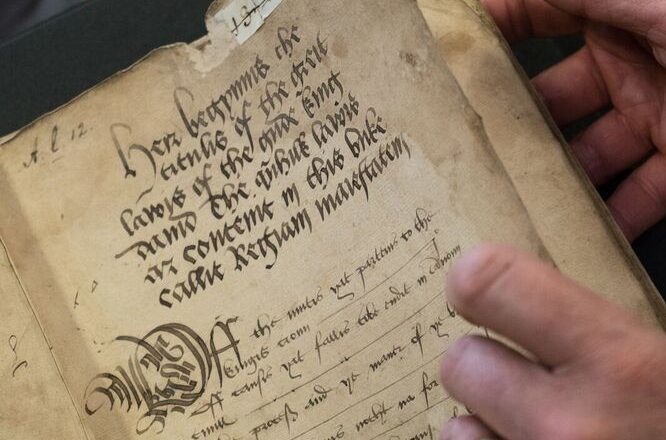A medieval book which once belonged to the Scots poet Alexander Hume has been bought by St Andrews University for £16,000.
Known as the Marchmont Manuscript, the book on Scots law was gifted to Hume by his uncle in 1582.
It is now part of the university’s special collections and will be used to help students as they learn to decipher early modern handwriting.
Hume was a student at St Andrews and attended St Mary’s College. He graduated with a Bachelor of Arts in 1574.
Dr Margaret Connolly, of the university’s School of English, said the purchase was symbolic because Hume had acquired the book after graduating and it will now be used by graduate students in St Andrews.
“This sixteenth century manuscript is about to enter a new phase of its working life,” she said.
“When it enters the library’s special collections it will be carefully looked after, but it will also once again be read by students – under close supervision – because we will use this manuscript in the teaching of early modern handwriting to postgraduate students in the schools of English and history.”
The Marchmont Manuscript was put up for auction at Bonhams and bought by the university for £16,250, with funding from Friends of the National Libraries and two private donations.
Written in Lowland Scots, the 450 year old manuscript contains Regiam Majestatem, the earliest surviving text giving a comprehensive overview of Scots law.
Unusually, the document was signed and dated by a named scribe.
It is very rare to have such precise details about the circumstances of a manuscript’s composition, or its first owner.
Signed and dated by Robert Ewyn on October 18, 1548, the collection bears the heraldic bookplate of Patrick Hume, first Earl of Marchmont and Lord High Chancellor of Scotland.
Professor John Hudson, a legal history expert at the university’s School of History, added: “Regiam Majestatem is Scotland’s first great law book. Its significance is both legal and ideological.
“To add a vernacular manuscript of the work to the Latin one which the university already owns is therefore a very pleasing achievement for Scotland’s oldest university.
“The work is of particular interest to the university’s recently founded Institute for Legal and Constitutional Research, publicity material for which already features the opening words of the Latin manuscript.
“Members of the Institute look forward to working on the manuscripts in coming years.”









